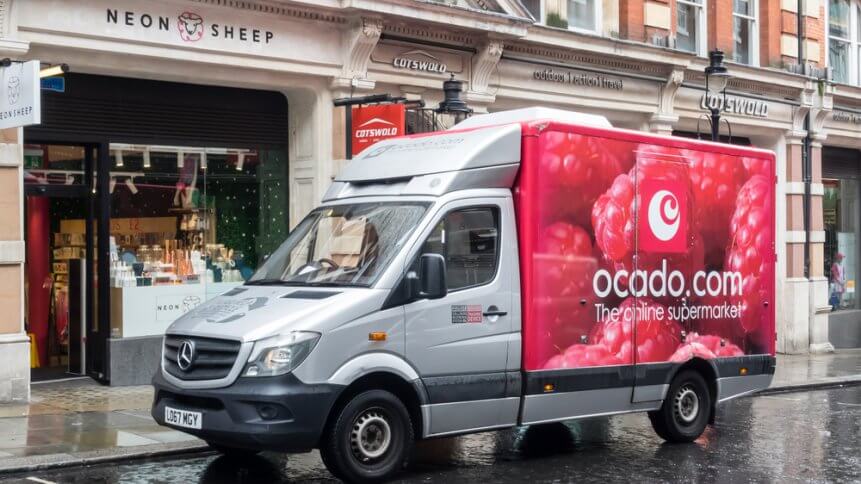Ocado on right track though critics remain sceptical

Ocado Solutions recently inked a technology partnership agreement with Japanese online grocery retailer Aeon, its first in Asia.
This built on a string of customer fulfillment center (CFC) – aka ‘shed’— deals with supermarket groups around the world, including Kroger in the US.
On the back of this, Ocado announced a £500 million (US$657 million) bond issue to fund deals won by Ocado Solutions. The online grocer said that the guaranteed senior unsecured convertible bonds, due 2025, are expected to carry a coupon of between 0.75 percent and 1.25 percent a year.
Eyebrows were raised in some quarters as, just a few days earlier, Ocado had been telling people it was in no great rush to raise cash. Shares in the company, meanwhile, fell nearly 7 percent following the news.
Certainly, it’s an expensive, risky road that the company is venturing down. In October, Kroger stock was downgraded from a buy to hold by analysts at equity research firm Jefferies.
It cited Kroger’s partnership with Ocado as a concern and a “misstep when compared to micro-fulfillment,” according to a note emailed to investors. Jefferies believes that each Ocado shed could take about four years to turn a profit and return limited market share gains.
“Unfortunately, details are lacking from [Kroger] concerning this agreement, including minimum capacity requirements, fee structure, and other assumptions that drive [management’s] expectation of a positive ROI by [year three],” analysts wrote.
Speedy delivery will be an issue with the Ocado sheds, given their location outside major metro areas. With a price tag of around US$55 million each and a two to three-year buildout timeframe, this is an expensive, time-consuming model that could run into roadblocks in a rapidly changing e-commerce space, Jefferies argues.
Constantly evolving
For this reason, it was interesting to see Ocado’s recent announcement that it will open its first mini CFC, in Bristol, UK.
The facility for Ocado Retail, the joint venture unit set up with Marks & Spencer earlier this year, is being built in an existing warehouse and will be the group’s sixth CFC when it goes live at the end of 2020 or early 2021.
It will have the capacity to process over 30,000 orders per week compared to approximately 85,000 orders per week expected from its larger CFC 5 site, currently under construction in Purfleet.
“The Ocado Smart Platform is constantly evolving as we innovate to adapt to changing customer needs. We can now deliver the best customer experience across a whole range of customer missions, through CFCs, mini CFCs, and micro-fulfillment centers,” says Tim Steiner, Chief Executive at Ocado Group.
“Ocado’s technology is dynamic and constantly improving, delivered through tried and tested solutions with proven and attractive economics. Our mission is to deliver the future of online shopping today, and we believe we are succeeding.”
YOU MIGHT LIKE

M&S bets big on Ocado tie up
Aeon
Back to the Aeon deal, which gets the thumbs up from GlobalData. With Japan emerging as an international leader in e-commerce and boasting one of the fastest growing and most frictionless online retail markets across the globe, retailers are increasingly moving away from offline business model towards one that integrates online sales more closely, it notes.
Japan’s retail industry is set to grow at a compound annual growth rate (CAGR) of 2.6 percent from US$969.1 billion in 2018 to US$1,101.5 billion in 2023.
Although, non-store retail forms only 12 percent of the total retail sales, it has grown at a rate of 6.8 percent in value sales in 2018. At the same time, online retail sales in Japan are projected to grow at a CAGR of 10.1 percent to reach US$102.4 billion in 2023.
“The move to partner Ocado will allow Aeon to leverage the Ocado Smart Platform and other software, as well as Ocado’s engineering and support services to launch a new online grocery business covering millions of customers across Japan,” says Shagun Sachdeva, Consumer Insights Analyst at GlobalData.
As part of the partnership, Aeon will develop a national fulfillment network to serve the whole of the Japanese market. It will also help the company to compete with its rivals such as Walmart’s Japanese supermarket chain Seiyu and Amazon Fresh.
On the other hand, the deal will allow Ocado to foray into the Japanese market and leverage Aeon’s longstanding brand presence and product positioning.








